| Srl | Item |
| 1 |
ID:
153133
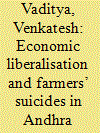

|
|
|
|
|
| Summary/Abstract |
Adversely affected by globalisation and state-based policy changes, India’s agricultural sector has recently experienced a marked increase in farmer suicides, most prominently in Andhra Pradesh (AP). This article examines the various policy changes leading to such agrarian distress and seeks to explore how the troubling phenomenon of farmers’ suicides may be curbed.
|
|
|
|
|
|
|
|
|
|
|
|
|
|
|
|
| 2 |
ID:
179986
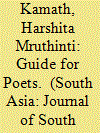

|
|
|
|
|
| Summary/Abstract |
Kavijanāśrayamu, or A Guide for Poets, is the oldest extant text on prosody written in Telugu. For centuries, poets and scholars have debated the authorship, date and geographical location of this text. According to some scholars, the text was authored by Malliya Recana, a Jain scholar of prosody from the tenth century who predates Nannaya, long considered to be the ‘first poet’ (ādikavi) of classical Telugu. In this article, I argue that the contentious epithet of ‘first poet’ ascribed to Recana is intimately tied to the premodern past and the contemporary landscape of the Telugu-speaking states of Telangana and Andhra Pradesh.
|
|
|
|
|
|
|
|
|
|
|
|
|
|
|
|
| 3 |
ID:
178520
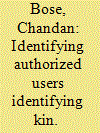

|
|
|
|
|
| Summary/Abstract |
The Geographical Indications of India Act requires a detailed description of ‘authorized users’ and ‘producers’ without concern for how these ‘producers’/ ‘authorized users’ are identified and what are the outcomes of such identification. Artisans identified as producers of GI registered ‘Cheriyal Painting’ of Telangana primarily belong to one genetically related family. Apart from members of the Danalakota household, GI also enumerates families of apprentices as ‘producers’. This article will highlight two things. First, it will demonstrate the way in which identification of ‘producers’/ ‘authorized users’ replicates not only the relational worlds within which producers exist but also the ‘obligations and moral imperatives’ embedded within those relations. Second, identifying oneself as a ‘producer’/ ‘authorized user’ requires distinguishing and individualizing one’s relatedness with the Danalakota family; promises of welfare by the state then become accessible only by becoming kin and distinguishing oneself as kin.
|
|
|
|
|
|
|
|
|
|
|
|
|
|
|
|
| 4 |
ID:
182848


|
|
|
|
|
| Summary/Abstract |
The city of Hyderabad has had a distinct linguistic and political history. It was a multilingual city with Urdu (and Persian) as the court languages under the Asaf Jahi dynasty until 1948, when it was annexed by the Indian union. While Hyderabad continues to be multilingual with Telugu, Urdu, Marathi, Kannada and Tamil being spoken in the city, its identity has undergone many changes. It became the Telugu capital city with the formation of Andhra Pradesh state in 1956. In 2014, it became the capital of the newly-formed Telangana state and Urdu was added to Telugu as the official language of the state in 2017. This article examines the transforming image of the city as constructed by Urdu, Telugu and Deccani language films from the 1950s to the present. Reading these films for the discourse on the city, it argues that each addressed its own imagined audience, claimed a specific identity for the city and invisiblised all others. The schism of representation reflected in the films is rooted in the city’s historical past and its multiple contested identities.
|
|
|
|
|
|
|
|
|
|
|
|
|
|
|
|
| 5 |
ID:
154557
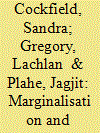

|
|
|
|
|
| Summary/Abstract |
India is in the grip of an agrarian crisis. Economic, social, environmental and political forces have adversely affected the relationship between the small-scale primary producer and the production process. In the context of this crisis, traditional knowledge-inspired food systems have given rise to ‘islands of success’ that have allowed small and marginal farmers to reclaim their livelihoods across the country. In this paper, we analyse three different islands of success using an agro-ecological framework, arguing that such islands of success based on traditional knowledge are becoming an increasingly necessary approach to agriculture. However, political will, political engagement and effective policies that support traditional knowledge in agriculture are required for these islands of success to become waves of change.
|
|
|
|
|
|
|
|
|
|
|
|
|
|
|
|
| 6 |
ID:
185972
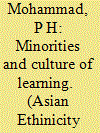

|
|
|
|
|
| Summary/Abstract |
What are the factors hindering educational development among Muslims in India in general and the newly born Telangana state in particular, is the key sociological question confronting the educationists and policymakers? The current paper based on empirical study provides an anthropological perspective to understand a number of socio-cultural factors responsible for lower retention and higher dropout rates among Muslims in public schools across the class and gender lines. It highlights that with positive state interventions, the enrolment and retention levels of Muslim working-class children have increased enormously besides a significant improvement in the same among Muslim girls also. Thus the paper argues that a relaxation in school protocols facilitates Muslim children integrating the academic demands and socio-cultural obligations they deem necessary while addressing culturally sensitive issues in curriculum and pedagogic practices foster attitudinal changes together which contribute immensely to the educational advancement among them.
|
|
|
|
|
|
|
|
|
|
|
|
|
|
|
|
| 7 |
ID:
105919


|
|
|
| 8 |
ID:
093929


|
|
|
| 9 |
ID:
170673


|
|
|
|
|
| Summary/Abstract |
This article examines and compares the status of land rights and their impacts on agricultural productivity, food security and well-being in a set of tribal and non-tribal villages in Telangana. Based on an intensive field survey, the research confirms that tribals without formal land rights remain largely unable to benefit from government support and access to private institutions in terms of getting credit and farm extension, whereas in non-tribal villages, government organisations are pro-active in providing such support. These findings confirm the need to increase the effectiveness of land rights and title documentation in India’s tribal villages to protect local people’s investments in land, enhance agricultural productivity and strengthen the long-term effectiveness of government programmes, which include avoidance of migration to the big cities
|
|
|
|
|
|
|
|
|
|
|
|
|
|
|
|
| 10 |
ID:
146876
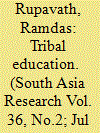

|
|
|
|
|
| Summary/Abstract |
This article critically examines initiatives for greater participation in education by tribal communities in India, arguing that current policy does not effectively enough facilitate greater participation and may, in fact, go against the avowed principle of ensuring greater equity. The article relies on fieldwork-based study to support arguments for the need to be culturally sensitive in making appropriate provisions for the education of scheduled tribes in India. Reasons for high dropout rates and non-enrolment among tribal children are examined and some searching questions are asked about why so many tribal people dislike schools.
|
|
|
|
|
|
|
|
|
|
|
|
|
|
|
|
| 11 |
ID:
187289
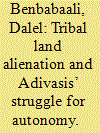

|
|
|
|
|
| Summary/Abstract |
Based on a case study of the Bhadrachalam Scheduled Area of Telangana, this article argues that the Adivasis of Central India seek autonomy as a response to their dispossession and to the accumulation of capital taking place in their resource-rich territories. The two main factors that have curtailed Adivasi autonomy through land alienation are analysed. The first is a process of agricultural colonization, wherein settlers belonging to agrarian dominant castes have moved into Adivasi territory and acquired tribal lands, thus dispossessing the original owners and reducing them to daily wage labourers. The second process is the industrialization of tribal areas where raw material is available and manpower is cheap, allowing for rapid accumulation through the exploitation of both nature and labour. Adivasis’ struggle for autonomy is therefore a way to reclaim control over their own resources and to preserve their distinct identity.
|
|
|
|
|
|
|
|
|
|
|
|
|
|
|
|
| 12 |
ID:
131141


|
|
|
|
|
| Publication |
2014.
|
| Summary/Abstract |
The problems arising from the bifurcation of Andhra Pradesh, such as the transfer of 205 tribal village in the submergence zone of the Polavaram project, begin to haunt K Chandrasekhar Rao, the Telangana chief minister.
|
|
|
|
|
|
|
|
|
|
|
|
|
|
|
|